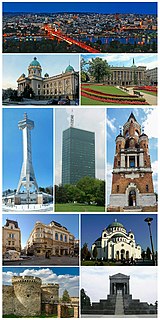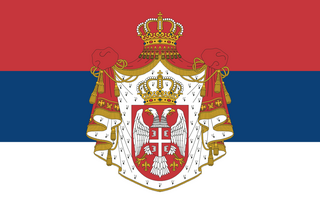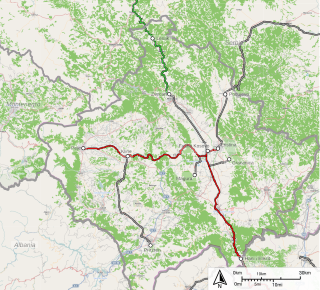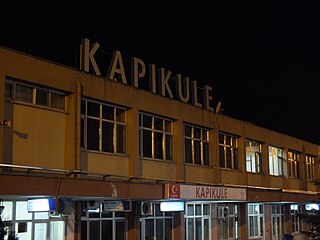
Serbia, officially the Republic of Serbia, is a landlocked country in Southeast Europe, at the crossroads of the Pannonian Plain and the Balkans. It shares land borders with Hungary to the north, Romania to the northeast, Bulgaria to the southeast, North Macedonia to the south, Croatia and Bosnia and Herzegovina to the west, and Montenegro to the southwest, and claiming a border with Albania through the disputed territory of Kosovo. Serbia with Kosovo has about 8.6 million inhabitants. Its capital Belgrade is also the largest city.

Belgrade is the capital and largest city of Serbia. It is located at the confluence of the Sava and Danube rivers and the crossroads of the Pannonian Plain and the Balkan Peninsula. Nearly 1.7 million people live within the administrative limits of the City of Belgrade.

The Orient Express was a long-distance passenger train service created in 1883 by the Belgian company Compagnie Internationale des Wagons-Lits (CIWL) that operated until 2009. The train traveled the length of continental Europe and into western Asia, with terminal stations in Paris and London in the northwest and Athens or Istanbul in the southeast.

Alexander I, also known as Alexander the Unifier, was the prince regent of the Kingdom of Serbia from 1914 and later the king of Yugoslavia from 1921 to 1934. He was assassinated by the Bulgarian Vlado Chernozemski of the Internal Macedonian Revolutionary Organization, during a 1934 state visit to France.

Peter I was the last king of Serbia, reigning from 15 June 1903 to 1 December 1918. On 1 December 1918, he became the first king of the Serbs, Croats and Slovenes, and he held that title until his death three years later. Since he was the king of Serbia during a period of great Serbian military success, he was remembered by the Serbian people as King Peter the Liberator, and also as Old King.

Velimir "Bata" Živojinović was a Yugoslav and Serbian actor and politician. He appeared in more than 340 films and TV series, and is regarded as one of the best actors in former Yugoslavia.

Borivoje "Bora" Todorović was a Serbian actor. He was the younger brother of the actress, Mira Stupica, and father of Srđan Todorović.

The Kingdom of Serbia was a country located in the Balkans which was created when the ruler of the Principality of Serbia, Milan I, was proclaimed king in 1882. Since 1817, the Principality was ruled by the Obrenović dynasty. The Principality, under the suzerainty of the Ottoman Empire, de facto achieved full independence when the last Ottoman troops left Belgrade in 1867. The Congress of Berlin in 1878 recognized the formal independence of the Principality of Serbia, and in its composition Nišava, Pirot, Toplica and Vranje districts entered the South part of Serbia.

Zoran Simjanović was a Serbian and Yugoslav musician, composer and music educator.

Predrag Miletić,, is a Serbian film, television, and theatre actor. Since 1981, Predrag Miletić has been a full-time member of the National Theatre in Belgrade, where he has appeared in more than 50 plays. Since 2014 he is the chairman of the board of the Puppet Theatre "Pinocchio" and since 2015 is the President of the Program Committee of the International Festival of Monodrama and Mime in Zemun.

Kosovo Railways, is the national railway company of Kosovo. It was originally formed as the Kosovo Railways J.S.C UNMIK Railways from the lines of the former Yugoslav Railways that lie on Kosovar territory. In 2011, the company was split into two public companies called Trainkos and Infrakos, the latter responsible for rail maintenance.

Kosovo unilaterally declared independence from Serbia in 2008, a move which Serbia rejects. Serbia does not recognize Kosovo as an independent state and continues to claim it as the Autonomous Province of Kosovo and Metohija. Initially there were no relations between the two; however, in the following years there has been increased dialogue and cooperation between the two sides.

Serbian–Turkish relations are foreign relations between Serbia and Turkey. Serbia has an embassy in Ankara and a consulate-general in Istanbul. Turkey has an embassy in Belgrade. Both countries are full members of the Council of Europe, the Organization for Security and Co-operation in Europe (OSCE), the Central European Free Trade Agreement (CEFTA) and the Organization of the Black Sea Economic Cooperation (BSEC).

The Friendship Express, was an international InterCity train jointly operated by the Turkish State Railways (TCDD) and TrainOSE from July 2005 to February 2011, linking Istanbul's Sirkeci Terminal, Turkey and Thessaloniki, Greece. Eastbound trains departed daily at 19:48 from Thessaloniki arriving to Istanbul at 08:07. Westbound trains departed at 20:30 from Istanbul, arriving to Thessaloniki at 09:33.

Boris Malagurski is a Serbian-Canadian film director, producer, writer, political commentator, television host and activist, his films include the documentary series The Weight of Chains.

The Chemins de fer Orientaux was an Ottoman railway company operating in Rumelia and later European Turkey, from 1870 to 1937. The CO was one of the five pioneer railways in the Ottoman Empire and built the main trunk line in the Balkans. Between 1889 and 1937, the railway hosted the world-famous Orient Express.

Kapıkule station, is the westernmost railway station in Turkey. It is located towards the north of Kapıkule, the frontier town on the Turkey/Bulgaria border. Kapıkule is a border station and the terminus for domestic trains in European Turkey. Only the Bosphorus Express to Bucharest and the Balkan Express to Belgrade continue across the border into Bulgaria. The station is the busier of the 2 operational border stations of the Turkish State Railways in Turkey, the other one being Kapıköy on the border with Iran.

The Balkan Express was an international overnight passenger train that ran between Istanbul, Turkey and Belgrade, Serbia, via Sofia, Bulgaria. The train began operations in 1991 from Istanbul to Budapest, Hungary, but was cut back to Belgrade after 2000. Service was discontinued in March 2013, when Sirkeci station closed for the construction of the Marmaray commuter rail network. In 2017, the Istanbul-Sofia Express was inaugurated as a successor to the Balkan Express, although the route was shortened to Sofia.
The Budapest–Belgrade–Skopje–Athens railway, a China-CEE "hallmark" project (2014) of Beijing’s Belt and Road initiative, is a planned railroad international connection in Central and Southeast Europe – between Budapest (Hungary), Belgrade (Serbia), Skopje, Athens and its China-run port of Piraeus (Greece). Planned speed is up to 200 km/h (120 mph) depending on the sections: 160 km/h (99 mph) on the Hungarian section between Budapest and Serbia, 200 km/h (120 mph) between the Hungarian border and Belgrade and on most of the Belgrade-Niš section, while the current line between Thessaloniki and Athens is 200 km/h (120 mph) with upgrades to 160 km/h (99 mph) ongoing. The Chinese planners do not comment on the other tracks' realizable speeds. Originally, they spoke of up to 300 km/h (190 mph) throughout.

Marko Živić was a Serbian actor and comedian. Dubbed as a great "showman" by media, Živić started his theatre career in 2002 at the Belgrade Drama Theatre. He initially rose to prominence for his role as Lepi Lukić in the televised comedy Folk. His later known portrayals are of good-hearted and vulnerable musician Mika Armonika in Psi laju, velar nosi and cunning drug dealer Vasilije in Shadows over Balkan. His film credits include Čitulja za Eskobara, The Belgrade Phantom and Montevideo, God Bless You!. Živić also hosted the Marko Živić Show.


















